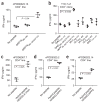Analysis of self-antigen specificity of islet-infiltrating T cells from human donors with type 1 diabetes
- PMID: 27798614
- PMCID: PMC5140746
- DOI: 10.1038/nm.4203
Analysis of self-antigen specificity of islet-infiltrating T cells from human donors with type 1 diabetes
Erratum in
-
Corrigendum: Analysis of self-antigen specificity of islet-infiltrating T cells from human donors with type 1 diabetes.Nat Med. 2017 Feb 7;23(2):264. doi: 10.1038/nm0217-264a. Nat Med. 2017. PMID: 28170374 Free PMC article. No abstract available.
-
Corrigendum: Analysis of self-antigen specificity of islet-infiltrating T cells from human donors with type 1 diabetes.Nat Med. 2017 Aug 4;23(8):1004. doi: 10.1038/nm0817-1004a. Nat Med. 2017. PMID: 28777787 Free PMC article. No abstract available.
Abstract
A major therapeutic goal for type 1 diabetes (T1D) is to induce autoantigen-specific tolerance of T cells. This could suppress autoimmunity in those at risk for the development of T1D, as well as in those with established disease who receive islet replacement or regeneration therapy. Because functional studies of human autoreactive T cell responses have been limited largely to peripheral blood-derived T cells, it is unclear how representative the peripheral T cell repertoire is of T cells infiltrating the islets. Our knowledge of the insulitic T cell repertoire is derived from histological and immunohistochemical analyses of insulitis, the identification of autoreactive CD8+ T cells in situ, in islets of human leukocyte antigen (HLA)-A2+ donors and isolation and identification of DQ8 and DQ2-DQ8 heterodimer-restricted, proinsulin-reactive CD4+ T cells grown from islets of a single donor with T1D. Here we present an analysis of 50 of a total of 236 CD4+ and CD8+ T cell lines grown from individual handpicked islets or clones directly sorted from handpicked, dispersed islets from nine donors with T1D. Seventeen of these T cell lines and clones reacted to a broad range of studied native islet antigens and to post-translationally modified peptides. These studies demonstrate the existence of a variety of islet-infiltrating, islet-autoantigen reactive T cells in individuals with T1D, and these data have implications for the design of successful immunotherapies.
Conflict of interest statement
The authors declare no competing financial interests.
Figures



References
-
- Nepom GT. Tetramer analysis of human autoreactive CD4-positive T cells. Adv Immunol. 2005;88:51–71. - PubMed
Publication types
MeSH terms
Substances
Grants and funding
- UC4 DK104155/DK/NIDDK NIH HHS/United States
- R21 AI126189/AI/NIAID NIH HHS/United States
- R01 DK081166/DK/NIDDK NIH HHS/United States
- UC4 DK108120/DK/NIDDK NIH HHS/United States
- U01 DK072473/DK/NIDDK NIH HHS/United States
- R24 DK106755/DK/NIDDK NIH HHS/United States
- U01 DK104162/DK/NIDDK NIH HHS/United States
- P01 AI042288/AI/NIAID NIH HHS/United States
- P60 DK020593/DK/NIDDK NIH HHS/United States
- R01 DK074656/DK/NIDDK NIH HHS/United States
- UC4 DK104211/DK/NIDDK NIH HHS/United States
- U01 DK089572/DK/NIDDK NIH HHS/United States
- UC4 DK104194/DK/NIDDK NIH HHS/United States
- T32 GM007347/GM/NIGMS NIH HHS/United States
- P30 DK020593/DK/NIDDK NIH HHS/United States
LinkOut - more resources
Full Text Sources
Other Literature Sources
Medical
Molecular Biology Databases
Research Materials

